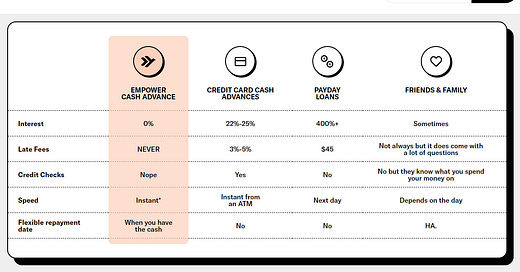Long Take: Lessons from Petal's sale to Empower, after nearly $1B in capital raised
And a deeper look into Empower Finance and Elevate Credit
Gm Fintech Architects —
Today we are diving into the following topics:
Summary: In this article, we discuss the financial and operational challenges faced by Petal, a fintech company aiming to innovate in the credit sector by using non-traditional underwriting methods, and its acquisition by Empower Finance. Despite raising significant funds, Petal and similar fintech endeavors like Empower Finance, which pivoted to cash advances, and Elevate Credit, which eventually was acquired at a fraction of its peak valuation, illustrate the harsh realities of lending-based business models. The lending sector, attractive for its upfront revenue, is fraught with risks of high defaults and regulatory challenges. We conclude that while fintech can reduce transactional frictions, it cannot alone solve the deeper economic issues that lead to financial distress for many consumers.
Topics: Petal, Empower Finance, Empower Retirement, Great-West insurance company, Power Corporation of Canada, Sequoia, Blisce Ventures, Acorns, Chime, Varo, Monzo, Starling, Revolut, Nubank, Cashalo, Elevate Credit, Park Cities Asset Management.
If you got value from this article, let us know your thoughts! And to recommend new topics and companies for coverage, leave a note below.
In Partnership
Generative Ventures invests in the machine economy — the financial activity settled on blockchain protocols and accelerated by the machine labor of generative AI.
Long Take
The Withering of Petal Card
Capital raised is often the metric by which we judge start-ups. Without visibility into the underlying dynamics of the business — profitability, customer retention — we are left interpreting the available signals. An institutional investor putting money into a company functions as that signal, as they’ve certainly done due diligence one cannot divine from the outside.
By that metric, Petal, the fintech credit builder company, looked successful to many of us. The company has raised over $300MM in equity to build its business, and over $680MM in debt financing to underwrite the credit provision.
Moreover, the US economy is powered so deeply by credit — from the retail consumer growing their household debt, to the US government itself, generating trillions in deficit every year and pushing treasuries to anyone who will hold them. Below, you can see the personal savings rate of American consumers at a local low below 5%, and the balance of revolving consumer credit at a historic high of $1.3 trillion. These trends are likely to continue, as they are the Western way of life.
Lending is one of the most attractive categories for entering Fintech, and unfortunately, also the most dangerous. We often discuss three available business models (1) money in motion, (2) money at rest, and (3) money at risk. Lending is in the third category and is seductive in that it generates revenue up-front, while creating large unknown risks on the back-end. Many venture investors have made the mistake of valuing underwriting revenues at SaaS multiples, only to have a credit cycle event completely destroy their companies through unexpected levels of defaults.
And so it is with Petal.





